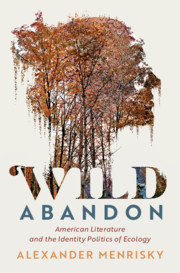Book contents
- Wild Abandon
- Cambridge Studies in American Literature and Culture
- Wild Abandon
- Copyright page
- Contents
- Acknowledgments
- Introduction Modern Environmentalism’s Identity Politics
- Chapter 1 The Ecological Alternative
- Chapter 2 The Entheogenic Landscape
- Chapter 3 The Universal Wilderness
- Chapter 4 The Essential Ecosystem
- Chapter 5 The Death of the Supertramp
- Conclusion Ecological Consistency
- Notes
- Bibliography
- Index
- Recent Books in This Series (continued from page ii)
Conclusion - Ecological Consistency
Published online by Cambridge University Press: 26 November 2020
- Wild Abandon
- Cambridge Studies in American Literature and Culture
- Wild Abandon
- Copyright page
- Contents
- Acknowledgments
- Introduction Modern Environmentalism’s Identity Politics
- Chapter 1 The Ecological Alternative
- Chapter 2 The Entheogenic Landscape
- Chapter 3 The Universal Wilderness
- Chapter 4 The Essential Ecosystem
- Chapter 5 The Death of the Supertramp
- Conclusion Ecological Consistency
- Notes
- Bibliography
- Index
- Recent Books in This Series (continued from page ii)
Summary
Wild Abandon’s conclusion contends that an identity politics of ecology is not only impossible to sustain but also politically undesirable, given its erasure of difference and its implicit nihilism – its suggestion that individuals and communities do not matter in the grand scheme of ecological change. However, the question driving the identity politics of ecology – how does one reconcile self with system? – continues to govern contemporary scholarship as well as mainstream representations of wilderness. Specifically, questions regarding the subject’s role in vital networks, its material heft or ephemerality, and the ontological and epistemological forces that center and decenter it remain the focus of scholarship in new-materialist philosophy, queer ecology, and material ecocriticism. In the process, these paradigms participate in the same circuit of ideas that gave rise to the identity politics of ecology. Keeping this point in mind, this conclusion considers how current reading practices might help or hinder environmentalist goals, and recommends that environmentalist thinking eschew the notion of authenticity altogether, in favor of a pragmatic politics of consistency.
Keywords
- Type
- Chapter
- Information
- Wild AbandonAmerican Literature and the Identity Politics of Ecology, pp. 199 - 209Publisher: Cambridge University PressPrint publication year: 2020

